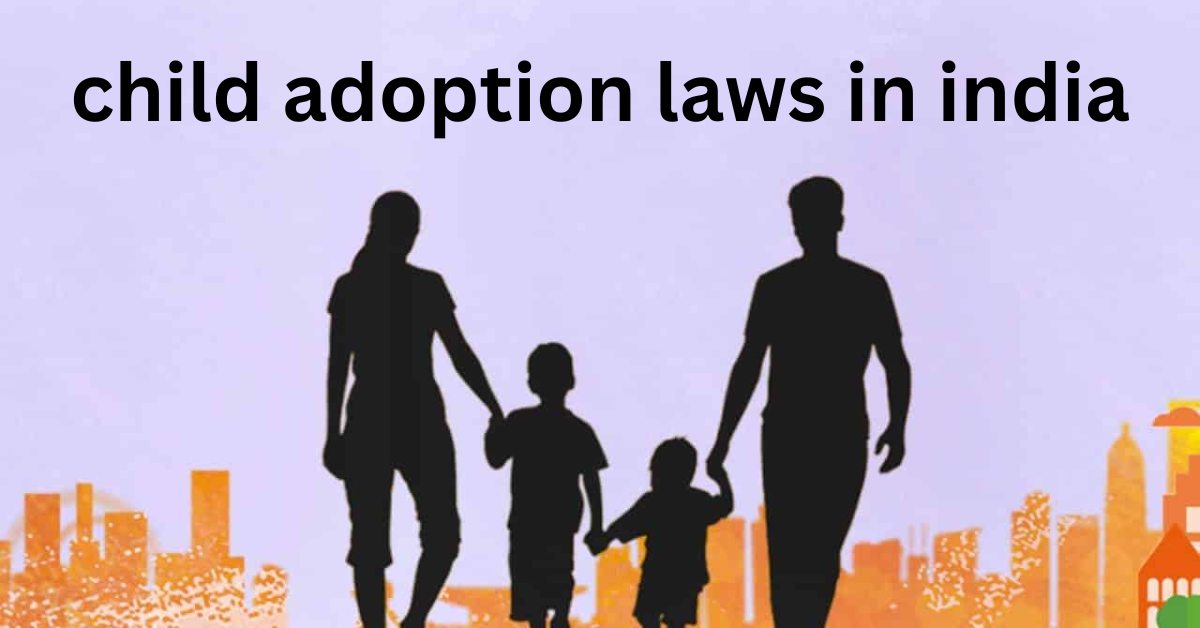Adoption is a noble act that provides children in need of care and protection a chance at a better life. In India, the legal framework surrounding adoption ensures that the process is structured, fair, and beneficial for both the adoptive parents and the children. However, adoption in India is governed by specific laws that outline the process, eligibility criteria, and the rights of the children being adopted.
Legal Framework for Adoption in India
In India, adoption laws differ for different religious communities. The primary legislation governing adoption is the Hindu Adoption and Maintenance Act, 1956 (HAMA) for Hindus, Buddhists, Sikhs, and Jains. For non-Hindus, the Guardian and Wards Act, 1890 governs the process. Additionally, the Juvenile Justice (Care and Protection of Children) Act, 2015 and the Central Adoption Resource Authority (CARA) play a vital role in managing the adoption process across India, particularly for children who are orphans, abandoned, or surrendered.
The Juvenile Justice Act and CARA aim to ensure that all adoptions, whether domestic or inter-country, are carried out following the best interests of the child.
The Adoption Process in India
The adoption process in India is designed to ensure that children are given homes where they will be loved and cared for. The process typically follows these steps:
1. Registration:
The first step is to register with an adoption agency or the CARA website. The agency will assist the prospective parents in navigating the process, whether the adoption is domestic or international.
2. Home Study and Counseling:
The agency will conduct a home study of the prospective adoptive parents to assess their living conditions and suitability to adopt. This is a comprehensive evaluation that includes interviews, background checks, medical reports, and counseling sessions to ensure the adoptive parents are prepared for the responsibilities of parenthood.
3. Child Matching:
After the home study process is completed, adoptive parents are matched with a child who fits their preferences, such as age, gender, and health condition. In India, children available for adoption are generally from orphanages or homes for abandoned children. The matching process ensures that the child’s welfare and the parents’ abilities are taken into consideration.
4. Legal Procedure:
Once a match is found, a petition for adoption is filed in the relevant court. The court will review the application and, if everything is in order, issue an adoption order. The finalization of the adoption legally transfers all parental rights and responsibilities to the adoptive parents.
5. Post-Adoption Follow-up:
After the adoption is granted, there are mandatory post-adoption counseling sessions and visits to the family to ensure the child is adjusting well. These follow-ups typically continue for a year.
Eligibility Criteria for Adoption in India
To adopt a child in India, both the adoptive parents and the child need to meet specific criteria:
Eligibility for Adoptive Parents:
- Age Criteria:
- The adoptive parents must be at least 25 years old, with the difference between the ages of the adoptive parents and the child being a minimum of 21 years.
- The maximum age for adoption is 55 years for a single person and 50 years for a couple.
- Marital Status:
- A married couple can adopt a child, with both partners consenting to the adoption.
- A single person, including a single woman, can adopt a child.
- Financial Stability:
- Prospective adoptive parents must be financially stable and able to provide for the child’s needs, ensuring that the child’s well-being is taken care of.
- Mental and Physical Health:
- Adoptive parents should be physically and mentally healthy, and no serious medical conditions that would affect parenting are allowed.
- No Criminal Record:
- Adoptive parents should have a clean criminal record. Any history of child abuse or neglect disqualifies the individual from adopting.
Eligibility for Children:
- Age of the Child:
- Children who are legally eligible for adoption must be under 18 years of age.
- Children aged 0-2 years are generally considered more desirable for adoption, while older children may have a longer waiting time.
- Legal Status:
- The child must be legally free for adoption, meaning they are either abandoned, surrendered, or orphaned. This is determined by the court before the adoption is finalized.
Rights of Adopted Children
Once the adoption process is completed, the adopted child enjoys the same legal rights as a biological child. The Hindu Adoption and Maintenance Act (HAMA) recognizes the child as the legitimate heir of the adoptive parents, ensuring they have all the rights to inheritance and other familial benefits.
Some key rights of adopted children include:
- Right to Name and Identity:
- The child is given the name of the adoptive family and becomes a part of their family records. This gives the child a new identity within the family unit.
- Right to Inheritance:
- An adopted child inherits property and wealth from the adoptive parents, just like a biological child. This includes both ancestral and self-acquired property.
- Right to Maintenance:
- The adopted child is entitled to financial support, education, and healthcare, similar to other children in the family.
- Right to Equal Treatment:
- Adopted children have the right to be treated equally and without discrimination by the adoptive parents and other family members.
- Right to Consent:
- While adoption is generally based on the best interests of the child, older children (above 9 years) must consent to the adoption.
Conclusion
Adoption in India is a comprehensive and structured process that ensures children in need of care and protection are given a loving and secure home. The legal framework governing adoption provides a transparent and systematic procedure, ensuring that the rights of both the adoptive parents and children are protected. By understanding the adoption process, eligibility criteria, and the rights of adopted children, prospective parents can confidently embark on their journey of adoption, knowing that they are making a positive impact on a child’s life.
Adopting a child is a life-changing decision that requires commitment, responsibility, and love. With the right legal guidance and support, adoption can be a fulfilling experience for both the parents and the children involved.

